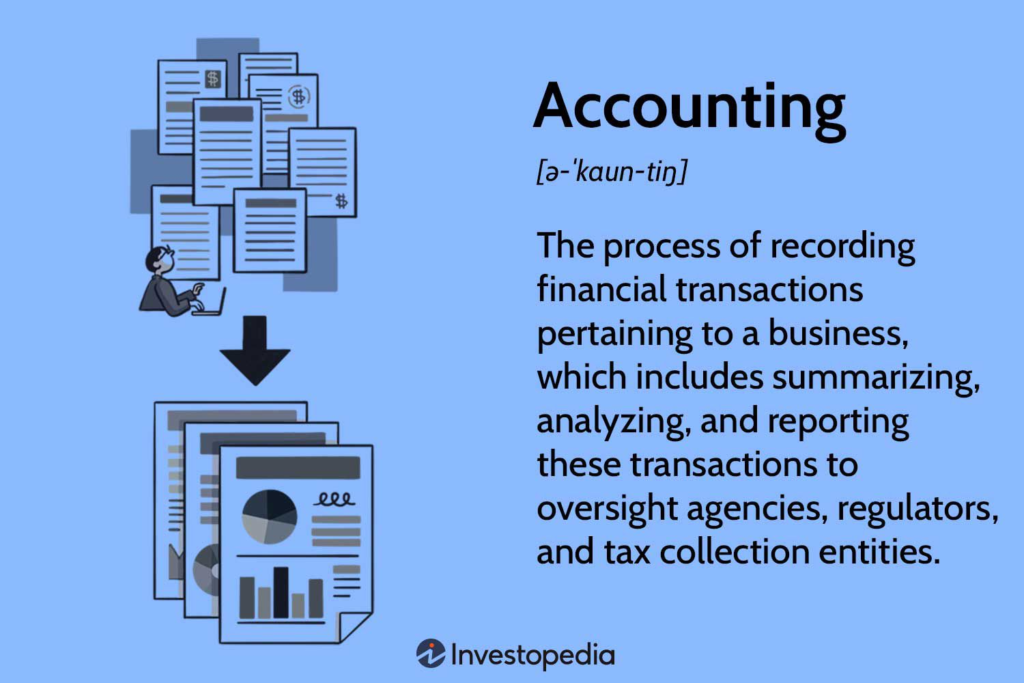Accounting plays a crucial role in the world of business. It provides an essential framework for measuring, analyzing, and communicating financial information, enabling stakeholders to make informed decisions. One of the most common phrases used in business circles is “accounting is the language of business.” But why is this so? In this article, we will explore the reasons why accounting is often referred to as the language of business, the critical role it plays, and how it enables organizations to function smoothly in a complex, competitive world.
Understanding the Role of Accounting
Accounting refers to the systematic process of recording, measuring, and interpreting financial transactions of a business. It involves activities such as bookkeeping, financial reporting, auditing, and analyzing financial statements. Through accounting, businesses are able to track their revenues, expenses, and profits, ensuring that they comply with regulations, stay solvent, and make sound decisions based on their financial health.
Businesses rely on accounting to generate reports that provide a clear picture of their financial status. These reports, such as the balance sheet, income statement, and cash flow statement, help various stakeholders, such as managers, investors, creditors, and regulators, to understand the business’s financial condition.
Accounting provides a structured language that everyone in the business world can understand, regardless of their expertise. It acts as a common point of reference for making decisions, which is why it is often described as the “language” of business.
The Universal Nature of Accounting

One of the reasons why accounting is called the language of business is because it is universal. No matter the size of a company, industry, or geographic location, accounting principles provide a consistent way to record and report financial data. This consistency ensures that businesses can communicate their financial performance in a way that is understandable to all stakeholders.
Whether a small start-up or a multinational corporation, accounting provides businesses with the necessary tools to measure their financial performance and plan for the future. By adhering to established accounting standards, businesses can compare their financial performance against industry benchmarks and previous periods, enabling them to make data-driven decisions.
Accounting Facilitates Communication
Like any language, accounting serves as a medium for communication between various stakeholders. Business owners and managers use accounting to communicate the financial health of the organization to investors, creditors, employees, and regulators. These stakeholders rely on financial statements to determine whether a business is profitable, stable, and capable of fulfilling its obligations.
For instance:
- Investors use financial data to assess the risk and return of investing in a company.
- Creditors analyze a company’s ability to repay loans.
- Managers use accounting to monitor and adjust business strategies to maximize profits.
Accounting is also essential for maintaining transparency and accountability within organizations. Accurate and reliable accounting records ensure that all stakeholders have access to the same financial information, promoting trust and confidence in the company’s operations.
Accounting as a Decision-Making Tool
Business decisions are often based on financial data, making accounting an indispensable tool for managers and business owners. The financial reports generated through accounting provide valuable insights into various aspects of a business, such as cash flow, profitability, cost control, and financial stability.
For example, through a profit and loss statement, managers can identify which products or services are the most profitable and which ones are underperforming. With this information, they can make informed decisions about pricing, production, and resource allocation to improve the company’s overall performance.
Moreover, accounting helps businesses identify potential financial problems before they become critical. By regularly reviewing financial data, business owners and managers can spot trends, such as declining revenues or increasing expenses, and take corrective action to prevent further issues.
Accounting Promotes Compliance and Accountability

One of the primary functions of accounting is to ensure that a business complies with relevant laws and regulations. Governments and regulatory bodies require businesses to maintain accurate accounting records to ensure they pay the correct taxes, comply with industry standards, and maintain financial transparency.
Accounting standards such as Generally Accepted Accounting Principles (GAAP) and International Financial Reporting Standards (IFRS) provide a set of guidelines that businesses must follow when preparing financial statements. These standards ensure that financial reports are prepared consistently and can be relied upon by external stakeholders.
Furthermore, accounting also promotes accountability within the organization. By maintaining accurate records, businesses can hold employees, managers, and executives responsible for their financial actions. This level of transparency helps to deter fraud, waste, and mismanagement.
Accounting Helps in Budgeting and Forecasting
Another key reason accounting is called the language of business is its role in budgeting and forecasting. Businesses need to plan ahead to stay competitive and profitable. Through accounting, companies can prepare detailed budgets, forecast future financial performance, and allocate resources efficiently.
A budget is essentially a financial plan that helps businesses allocate funds to various departments, projects, or initiatives. Accounting data serves as the foundation for creating accurate budgets by providing historical financial information and identifying spending patterns. With a solid budget in place, businesses can make sure they operate within their means and avoid unnecessary expenditures.
Forecasting, on the other hand, involves predicting future financial performance based on past data and market trends. Accounting plays a crucial role in forecasting by providing businesses with reliable financial data, which helps them predict future revenues, expenses, and profits. Accurate forecasting enables businesses to make proactive decisions, reduce risks, and achieve long-term success.
Accounting Enhances Business Performance

In the business world, performance is everything. A company’s ability to succeed and grow depends heavily on its ability to make informed decisions based on financial data. Accounting provides the tools necessary to assess business performance, identify weaknesses, and optimize operations.
By regularly analyzing financial statements and accounting reports, businesses can evaluate key performance indicators (KPIs), such as return on investment (ROI), profit margins, and cost-efficiency. These metrics allow companies to track their progress, set performance goals, and identify areas that require improvement.
Furthermore, accounting provides insight into a company’s financial structure, helping it determine whether it is financially sound or over-leveraged. A solid understanding of financial performance enables businesses to make adjustments to their operations, leading to improved profitability and sustainable growth.
Conclusion
Why is Accounting Called the Language of Business? offering a universal framework for recording, analyzing, and communicating financial information. It plays a critical role in decision-making, fostering transparency, ensuring compliance, and helping businesses stay competitive. From budgeting and forecasting to promoting accountability and financial performance, accounting is at the heart of every successful business operation.
Without accounting, businesses would struggle to understand their financial health, make informed decisions, or communicate with stakeholders effectively. Whether you’re a small business owner or the CEO of a large corporation, accounting is the language that helps you speak the same financial “language” as others in the business world.
Desclaimer
The information provided in this article is for informational purposes only and should not be considered as professional financial advice. While every effort has been made to ensure accuracy, the author and publisher are not responsible for any errors or omissions. Always consult with a qualified financial professional for specific advice.










